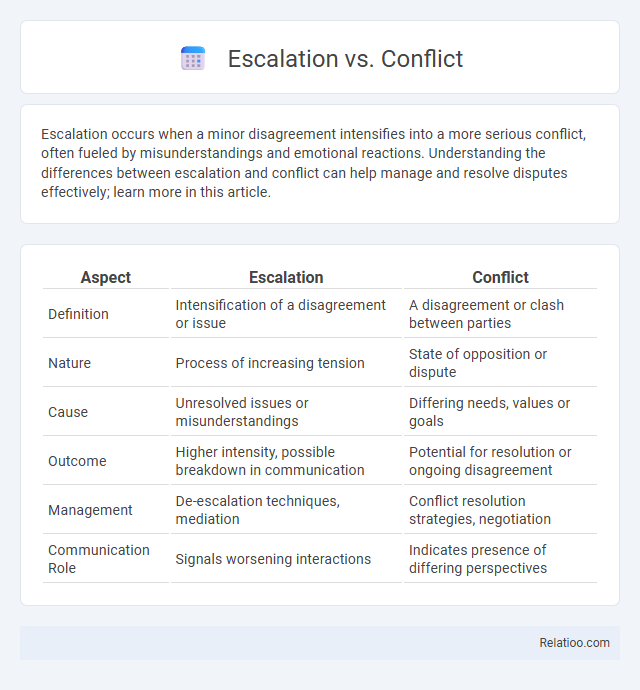Escalation occurs when a minor disagreement intensifies into a more serious conflict, often fueled by misunderstandings and emotional reactions. Understanding the differences between escalation and conflict can help manage and resolve disputes effectively; learn more in this article.
Table of Comparison
| Aspect | Escalation | Conflict |
|---|---|---|
| Definition | Intensification of a disagreement or issue | A disagreement or clash between parties |
| Nature | Process of increasing tension | State of opposition or dispute |
| Cause | Unresolved issues or misunderstandings | Differing needs, values or goals |
| Outcome | Higher intensity, possible breakdown in communication | Potential for resolution or ongoing disagreement |
| Management | De-escalation techniques, mediation | Conflict resolution strategies, negotiation |
| Communication Role | Signals worsening interactions | Indicates presence of differing perspectives |
Understanding Escalation and Conflict
Understanding escalation involves recognizing the process where conflicts intensify due to emotional, communication, or behavior patterns that amplify disagreements. Conflict represents the initial disagreement or clash of interests, ideas, or values, which may or may not evolve into escalation based on how parties manage their responses. Your ability to identify early signs of conflict and intervene effectively can prevent escalation, promoting resolution and maintaining healthy relationships.
Key Differences Between Escalation and Conflict
Conflict involves a disagreement or clash between parties, often rooted in differing needs or values, while escalation refers to the process by which a conflict intensifies in severity or scope. Key differences between escalation and conflict include their dynamic nature: conflict is the initial state of opposition, whereas escalation signifies an increase in conflict intensity, often marked by heightened emotions, actions, or stakes. Effective conflict management aims to prevent escalation by addressing conflicts early and reducing misunderstandings or aggressive behaviors.
Causes of Conflict in Organizations
Causes of conflict in organizations often stem from communication breakdowns, differing values, and resource scarcity. Misaligned goals, role ambiguity, and power struggles further exacerbate tensions between employees or departments. Understanding these root causes is crucial for preventing escalation and managing conflicts effectively to maintain organizational harmony.
Stages of Escalation in Disputes
Stages of escalation in disputes generally begin with latent conflict, where underlying tensions exist without open confrontation. As differences intensify, disputes move into perceived and felt conflict stages, where parties recognize the issue and experience emotional involvement. Understanding these stages helps you intervene effectively before disputes escalate into destructive conflict or full escalation, damaging relationships and communication.
The Role of Communication in Escalation
Effective communication plays a critical role in the escalation process by either mitigating or intensifying conflicts based on how messages are conveyed and interpreted. Miscommunication or lack of clear dialogue often accelerates escalation, while timely, transparent exchanges help de-escalate tensions and promote resolution. Conflict resolution strategies emphasize active listening, empathy, and clarity as essential communication components to control escalation dynamics.
Signs of Escalation in Conflict Situations
Signs of escalation in conflict situations include increased intensity of emotions such as anger or frustration, raised voices, and aggressive body language. Your ability to recognize repeated interruptions, personal attacks, or refusal to listen can indicate that the conflict is moving towards escalation. Monitoring these behavioral changes helps in managing conflicts before they evolve into full-scale escalation.
Managing Conflict to Prevent Escalation
Managing conflict involves identifying underlying issues early and applying effective communication strategies to address concerns before they intensify. Your ability to remain calm, listen actively, and negotiate solutions helps prevent escalation, reducing the risk of disputes turning into major confrontations. Implementing conflict resolution techniques fosters a collaborative environment that mitigates tension and promotes constructive dialogue.
Escalation Triggers and Their Impact
Escalation triggers such as miscommunication, unmet expectations, and perceived threats intensify conflicts by amplifying emotional responses and reducing cooperation. Your ability to recognize these triggers early minimizes the risk of escalation, preventing conflicts from becoming destructive. Understanding the impact of escalation triggers helps maintain resolution efforts and promotes effective conflict management strategies.
Strategies for De-Escalation
Effective strategies for de-escalation prioritize clear communication, active listening, and empathy to reduce tension during conflicts. Implementing calm body language, maintaining a neutral tone, and recognizing underlying emotions helps prevent escalation and fosters resolution. Conflict management techniques such as mediation and problem-solving create structured environments where parties feel heard and cooperative solutions emerge.
Building a Culture of Conflict Resolution
Building a culture of conflict resolution involves recognizing the distinctions between conflict, escalation, and effective de-escalation strategies to maintain a harmonious workplace. Conflict represents the initial disagreement or tension, while escalation refers to the intensification of the conflict, often leading to unproductive outcomes and damaged relationships. Implementing proactive communication, empathy, and structured problem-solving techniques helps organizations transform potential escalations into opportunities for collaboration and growth.

Infographic: Escalation vs Conflict
 relatioo.com
relatioo.com